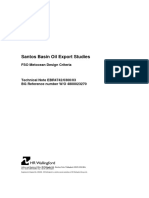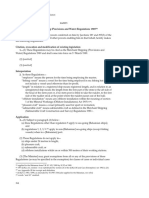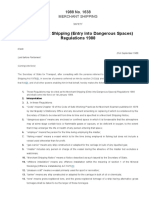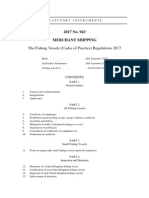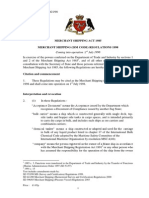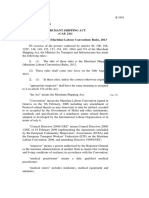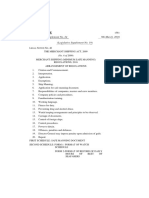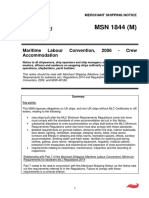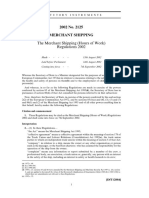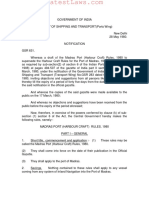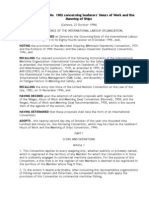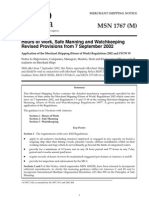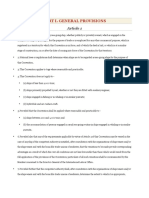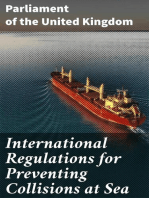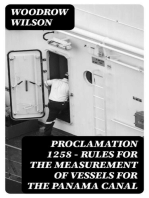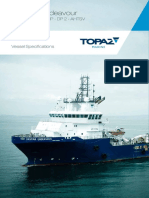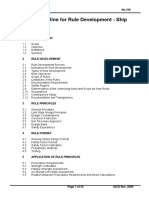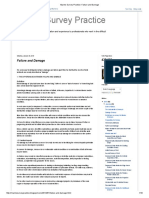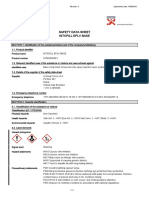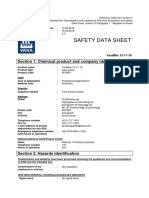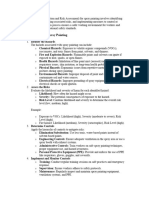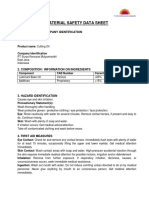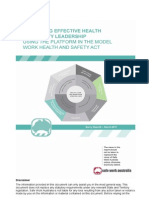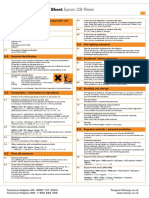Means of Access 1988
Means of Access 1988
Uploaded by
Jym GensonCopyright:
Available Formats
Means of Access 1988
Means of Access 1988
Uploaded by
Jym GensonOriginal Description:
Copyright
Available Formats
Share this document
Did you find this document useful?
Is this content inappropriate?
Copyright:
Available Formats
Means of Access 1988
Means of Access 1988
Uploaded by
Jym GensonCopyright:
Available Formats
Merchant Shipping (Means of Access) Regulations
317
MERCHANT SHIPPING
SAFETY
The Merchant Shipping (Means of Access)
Regulations 1988
168
[The Minister] in exercise of the powers conferred on him by [section 187 of the Merchant
Shipping Act], and of all other powers enabling him in that behalf, hereby makes the
following Regulations:
Citation [and commencement]
1.(1) These Regulations may be cited as the Merchant Shipping(Means of Access)
Regulations 1988 and shall come into force on 1
st
January 1989.
(2) [omitted]
Interpretation
2. In these Regulations:
access means embarking on or disembarking from a ship;
Code means Chapter 8 of the Code of Safe Working Practices for Merchant Seamen
published [in the United Kingdom] in 1978 by Her Majestys Stationery Office
and any document amending or replacing it which is considered by [the Minister]
to be relevant from time to time and is specified in a Merchant Shipping Notice;
employer means a person for the time being employing the master;
fishing vessel means a vessel for the time being employed in fishing but does not
include a vessel used otherwise than for profit;
master includes any person in charge of a ship during the absence of the master but
excludes a watchman;
Merchant Shipping Notice means a Notice described as such and issued by the
Secretary of State [of the United Kingdom for Transport];
offshore installation means any installation within the meaning of section 1 of the
Mineral Workings (Offshore Installations Act 1971
(a)
169
;
pleasure craft means a vessel primarily used for sport or recreation;
portable ladder does not include a rope ladder.
Application
3.(1) Subject to paragraph (2) of this regulation,
(a) these Regulations except regulation 14 apply to [Bahamian] ships; and
(b) these Regulations, other than regulations 5, 6, 7(c) and 13, apply to ships other
than [Bahamian] ships when they are in a port in [the Bahamas].
170
(2) These Regulations do not apply to
(a) fishing vessels,
(b) pleasure craft,
168
applied in the Bahamas from UK SI 1637/1988 by SI 54/1988
(a)
1971 [UK] c.61 was substituted by section 24 of the [UK] Oil and Gas (Enterprise) Act 1982 (c.23).
169
see Appendix III for excerpt and definition
170
words substituted by regulation 3 of the Merchant Shipping (Safety at Work Regulations)(Non-Bahamian
Ships) Regulations applied in the Bahamas in 1989 by SI 31/1989 from UK SI 2274/1988
The Complete Merchant Shipping Legislation
318
(c) offshore installations whilst on or within 500 metres of their working stations, or
(d) ships in which there is for the time being no master or crew or watchman.
(3) The [Minister] may grant exemptions from all or any of the provisions of these
Regulations (as may be specified in the exemption) for classes of cases or individual cases
on such terms (if any) as he may so specify and may, subject to giving reasonable notice,
alter or cancel any such exemption. Any exemption given pursuant to the Regulations
revoked by these Regulations shall continue in effect as if made under these Regulations;
and any reference in such an exemption to a provision of those Regulations shall be
construed as referring to the corresponding provision in these Regulations.
General duties concerning access arrangements
4.(1) The employer and the master shall ensure that there is a safe means of access
between the ship and any quay, pontoon or similar structure or another ship alongside
which the ship is secured and in particular (and without prejudice to the generality of such
duty) the employer and the master shall ensure that
(a) any equipment necessary to provide a safe means of access is placed in position
promptly after the ship has been so secured and remains in position while the ship
is so secured;
(b) access equipment which is in use:
(i) is properly rigged, secured, deployed, and is safe to use; and
(ii) is so adjusted from time to time as to maintain safety of access;
(c) access equipment and immediate approaches thereto are adequately illuminated;
(d) any equipment used for means of access and any safety net is of good construction,
of sound material, of adequate strength for the purposes for which it is used, free
from patent defect and properly maintained.
(2) When access is necessary between ship and shore, and the ship is not secured
alongside, the employer and master shall ensure that such access is provided in a safe
manner.
(3) The employer and the master in carrying out the obligations contained in this
regulation shall take full account of the principles and guidance in the Code.
Gangways
5. In every ship of 30 metres or more registered length (or, in the case of an
unregistered ship, of 30 metres or more overall length) the employer shall ensure that there
is carried on the ship a gangway which is appropriate to the deck layout, size, shape and
maximum freeboard of the ship, and which complies with the specifications contained in
section 2 of the Code.
Accommodation ladders
6. In every ship of 120 metres or more in registered length (or, in the case of an
unregistered ship, of 120 metres or more overall length) the employer shall ensure that
there is carried on the ship an accommodation ladder which is appropriate to the deck
layout, size, shape and maximum freeboard of the ship, and which complies with the
specifications contained in section 2 of the Code.
Portable and Rope Ladders
7. The employer and the master shall ensure that
(a) a portable ladder is used for the purpose of access to the ship only where no safer
Merchant Shipping (Means of Access) Regulations
319
means of access is reasonably practicable;
(b) a rope ladder is used only for the purpose of access between a ship with high
freeboard and a ship with low freeboard or between a ship and a boat if no safer
means of access is reasonably practicable;
(c) any rope ladder used for the purpose of access to a ship complies with the
specifications contained in section 2.6 of the Code;
provided that the requirements of this regulation shall not affect the requirements of the
Merchant Shipping (Pilot Ladders and Hoists) Regulations 1987
171
.
Life-buoys
8. The employer and the master shall ensure that a life-buoy with a self-activating light
and also a separate safety line attached to a quoit or similar device provided ready for use
at the point of access aboard the ship.
Safety nets
9.(1) The employer and master shall ensure that an adequate number of safety nets is
carried on the ship or is otherwise readily available.
(2) The master shall ensure that where access equipment is in use and there is a risk of a
person falling from that access equipment or from the ship or from the quayside
immediately adjacent to the access equipment, a safety net is mounted in order to minimise
the risk of injury.
Use of equipment
10. Where access equipment is provided in accordance with these Regulations any
person boarding or leaving the ship shall use that equipment except in emergencies.
Penalties
11.(1) Contravention of regulation 4, 5, 6, 7, 8 or 9 by an employer shall be an offence
punishable on summary conviction by a fine not exceeding 2,000 or on conviction on
indictment by imprisonment for a term not exceeding two years or such fine, or both.
(2) Contravention of regulation 4, 7, 8 or 9 by a master shall be an offence punishable
only on summary conviction by a fine not exceeding 1,000.
(3) Contravention of regulation 10 shall be an offence punishable only on summary
conviction by a fine not exceeding 400.
(4) It shall be a defence for a person charged in respect of a contravention of regulation
4(1) or (2) or 9(2) to show that the requirements of the relevant regulation were complied
with so far as was reasonably practicable.
(5) It shall be a defence for a person charged under these Regulations, including a
person charged by virtue of regulation 12, to show that he took all reasonable precautions
and exercised all due diligence to avoid the commission of the offence.
12. Where an offence under any of these Regulations is committed, or would have been
171
UK SI 1987/1961 formally applied in the Bahamas and repealed by Merchant Shipping (Amendment) Act 2000
(34 of 2000). see now Regulation 17 of Chapter V of SOLAS 74/88. For definition of SOLAS 74/88 see section
185 of the Merchant Shipping Act.
The Complete Merchant Shipping Legislation
320
committed except for the operation of regulation 11(5), by any person due to the act or
default of some other person, that other person shall be guilty of the offence, and a person
may be charged with and convicted of the offence by virtue of this regulation whether or
not proceedings are taken against the first-mentioned person.
Inspection and detention of a [Bahamian] ship
13. Any person duly authorised by [the Minister] may inspect any [Bahamian] ship
and if he is satisfied that there has been a failure to comply in relation to that ship with the
requirements of these Regulations he may detain the ship until the health and safety of all
employees and other persons aboard ship is secured, but shall not be in exercise of these
powers detain or delay the ship unreasonably.
Inspection, detention and other measures in respect of ships registered outside [the
Bahamas]
14.(1) Any person duly authorised by [the Minister] may inspect any ship other than a
[Bahamian ship] when the ship is in a [Bahamian] port and if he is satisfied that the ship
does not conform to the standards of health and safety required of [Bahamian] ships by
these Regulations he may:
(a) send a report to the government of the country in which the ship is registered, and a
copy thereof to the Director-General of the International Labour Office; and
(b) where conditions on board are clearly hazardous to safety or health:
(i) take such measures as are necessary to rectify those conditions;
(ii) detain the ship:
provided that the measures specified in sub-paragraphs (a) and (b) may be taken only
when the ship has called at a [Bahamian] port in the normal course of business or for
operational reasons.
(2) If he takes either of the measures specified in paragraph (1)(b) the person authorised
shall forthwith notify the nearest maritime, consular or diplomatic representative of the
State whose flag the ship is entitled to fly.
(3) The person duly authorised shall not in the exercise of his powers under this
Regulation unreasonably detain or delay the ship.
Compensation and Enforcement of Detention
15. [Regulation 15 is not reproduced here as it is unlikely that it is applied under the MSA. For
compensation provisions please see section 211, MSA.]
_________________
Merchant Shipping (Means of Access) Regulations
321
EXPLANATORY NOTE
(This note is not part of the Regulations)
172
These Regulations give effect in part to the Merchant Shipping (Minimum Standards)
Convention 1976 (International Labour Organisation Convention 147)
173
which is in force
internationally, and requires provisions to be made substantially equivalent to those of
(amongst other Conventions) the Prevention of Accidents (Seafarers) Convention 1970
(International Labour Organisation Convention 134 Article 4
174
. The Regulations, with other
provisions, will also allow ratification by [the Bahamas] of the Convention, and
implementation of a recommendation, concerning occupational safety an d health in dock
work (International Labour Organisation Convention 152)
175
in force internationally.
Exemptions can now be granted from all the provisions of the Regulations (regulation 3);
there is now a general duty on the employer and master to ensure safe means of access to a
ship (regulation 4(1)); the employer and master are required to take full account of the
principles and guidelines set out in the revised Chapter 8 of the Code of Safe Working
Practices for Merchant Seamen set out in Merchant Shipping Notice M1343. (This Code
contains much of the requirement formerly detailed in the Regulations with regard to
equipment specifications and the way the equipment is to be used.) There is a new
regulation regarding the use of rope ladders (regulation 7(b) and (c)) and there is also an
obligation on any person boarding a ship to use the access equipment provided (regulation
10). The penalties have been increased and the defences available to a person charged under
the Regulations have been augmented.
[Merchant Shipping Notices and ILO Conventions may be obtained as detailed in Appendix
VII].
_________________
172
words omitted.
173
words omitted.
174
words omitted.
175
words omitted.
You might also like
- Solas 1929Document64 pagesSolas 1929BGWebbie100% (1)
- Metocean Data PDFDocument101 pagesMetocean Data PDFJym Genson100% (1)
- Legislative Decree 271 - 99Document14 pagesLegislative Decree 271 - 99volgNo ratings yet
- Topaz Mamlaka Vss Feb2016Document7 pagesTopaz Mamlaka Vss Feb2016Jym GensonNo ratings yet
- LR EN 10204 Type 3Document2 pagesLR EN 10204 Type 3Jym GensonNo ratings yet
- Madalina Cazacu Observation 1Document6 pagesMadalina Cazacu Observation 1Ionut MireaNo ratings yet
- Document Control Register 2021Document19 pagesDocument Control Register 2021Ashik M AliNo ratings yet
- Guarding of Machinery and Safety of Electrical Equipment 1988 As AmendedDocument4 pagesGuarding of Machinery and Safety of Electrical Equipment 1988 As Amendedgsp.centaurusNo ratings yet
- Provisions and Water 1989Document3 pagesProvisions and Water 1989gsp.centaurusNo ratings yet
- Entry Into Dangerous Spaces Regulations 1998 - 1638Document5 pagesEntry Into Dangerous Spaces Regulations 1998 - 1638Vadim RayevskyNo ratings yet
- Provisions and Water Regulations - SI 1989-0102Document4 pagesProvisions and Water Regulations - SI 1989-0102Vadim RayevskyNo ratings yet
- Bahamas Merchant Shipping (Crew Accommodation) Regulations 1978Document76 pagesBahamas Merchant Shipping (Crew Accommodation) Regulations 1978何吉飞No ratings yet
- Psma 1984Document17 pagesPsma 1984rizamryNo ratings yet
- Medical Examination 1983 As AmendedDocument7 pagesMedical Examination 1983 As Amendedgsp.centaurusNo ratings yet
- Merchant LOLERDocument16 pagesMerchant LOLERAJITH VSNo ratings yet
- The Merchant Shipping (Crew Agreements, Lists of Crew and Discharge of Seamen) Regulations 1991Document9 pagesThe Merchant Shipping (Crew Agreements, Lists of Crew and Discharge of Seamen) Regulations 1991Vadim RayevskyNo ratings yet
- The Fishing Vessels (Codes of Practice) Regulations 2017Document16 pagesThe Fishing Vessels (Codes of Practice) Regulations 2017amasrurNo ratings yet
- JAM Factories Act RDDocument30 pagesJAM Factories Act RDhpaisleyNo ratings yet
- Act of 16 February 2007 No. 9Document19 pagesAct of 16 February 2007 No. 9alexNo ratings yet
- Ilo 92 EngDocument16 pagesIlo 92 EngMehmet Akif HosanliNo ratings yet
- Ilo C133Document10 pagesIlo C133razormebackNo ratings yet
- Emergency Procedures & Safety of NavigationDocument38 pagesEmergency Procedures & Safety of NavigationNimeni Altu'No ratings yet
- Hand SignalsDocument20 pagesHand SignalsHalley ElangovanNo ratings yet
- Code of Safe Working Practices For Merchant Seamen Regul 1998 - 1838Document4 pagesCode of Safe Working Practices For Merchant Seamen Regul 1998 - 1838Vadim RayevskyNo ratings yet
- Merchant Shipping (Fishing Vessels) (Minimum Safety and Health Requirements) RegulationsDocument15 pagesMerchant Shipping (Fishing Vessels) (Minimum Safety and Health Requirements) Regulationsg665013No ratings yet
- Crew AgreementDocument6 pagesCrew AgreementMuhammad AliNo ratings yet
- SD 42198 Ms Is M Code Regulations 1Document8 pagesSD 42198 Ms Is M Code Regulations 1Jaspal Singh SahotaNo ratings yet
- MLC Area 08 - Accommodation - ILO - 1953-01-29 - Convention 092Document13 pagesMLC Area 08 - Accommodation - ILO - 1953-01-29 - Convention 092Milan ChaddhaNo ratings yet
- LN145Document115 pagesLN145..No ratings yet
- ILO C092 - Accommodation of Crews Convention (Revised), 1949Document13 pagesILO C092 - Accommodation of Crews Convention (Revised), 1949sadık can özdamarNo ratings yet
- GD 1135 on 2006Document13 pagesGD 1135 on 2006fa783986No ratings yet
- Order On Offshore Diving Operations and Offshore Diving EquipmentDocument6 pagesOrder On Offshore Diving Operations and Offshore Diving EquipmentMohamedNo ratings yet
- Merchant Shipping MINIMUM SAFE MANNING Regulations 2016Document14 pagesMerchant Shipping MINIMUM SAFE MANNING Regulations 2016Arthur Schout100% (1)
- The Merchant Shipping Pilot Ladders and Hoists Regulations 1987Document10 pagesThe Merchant Shipping Pilot Ladders and Hoists Regulations 1987Hkn OzzNo ratings yet
- Ireland ConventionDocument77 pagesIreland Conventionstrava.iyqdxNo ratings yet
- MLC Crew AccommodationDocument16 pagesMLC Crew AccommodationigorNo ratings yet
- A Is In: Ndia CT W PreambleDocument4 pagesA Is In: Ndia CT W PreambletogetherweddinghrmdyNo ratings yet
- Port Act 1908Document20 pagesPort Act 1908Adnan HameedNo ratings yet
- Hours of Work Regulations 2002-2125Document12 pagesHours of Work Regulations 2002-2125Vadim RayevskyNo ratings yet
- ILO C133 - Accommodation of Crews (Supplementary Provisions) Convention, 1970Document11 pagesILO C133 - Accommodation of Crews (Supplementary Provisions) Convention, 1970sadık can özdamarNo ratings yet
- The Merchant Shipping ActDocument291 pagesThe Merchant Shipping ActMohd Shaji100% (1)
- C133 Accommodation of CrewsDocument12 pagesC133 Accommodation of CrewsMehmet Akif HosanliNo ratings yet
- Time Charter Agreement of MT Banglar Agragoti, Charter Party Dated: 20Document39 pagesTime Charter Agreement of MT Banglar Agragoti, Charter Party Dated: 20adit didotNo ratings yet
- Madras Port (Harbour Craft) Rules, 1980Document20 pagesMadras Port (Harbour Craft) Rules, 1980Latest Laws TeamNo ratings yet
- ILO Convention (No. 180) Concerning Seafarers' Hours of Work and The Manning of ShipsDocument7 pagesILO Convention (No. 180) Concerning Seafarers' Hours of Work and The Manning of ShipsEric MoraNo ratings yet
- Ilo Convetion 133Document12 pagesIlo Convetion 133Vicmel DiazNo ratings yet
- New Mangalore Port Trust Employees (Licensing of Stevedors) Regulations, 2009Document7 pagesNew Mangalore Port Trust Employees (Licensing of Stevedors) Regulations, 2009Latest Laws TeamNo ratings yet
- Bunkering Guidelines and Regulations v2, Manchester Ship Canal Company LimitedDocument11 pagesBunkering Guidelines and Regulations v2, Manchester Ship Canal Company LimitedTammam HassanNo ratings yet
- Malta Kılavuz Kaptan MevzuatıDocument26 pagesMalta Kılavuz Kaptan MevzuatıcptmehmetkaptanNo ratings yet
- MSN 1767 (M) - Hour of Work, Safe ManningDocument20 pagesMSN 1767 (M) - Hour of Work, Safe ManningJose GisulturaNo ratings yet
- Chain Ferry Code FinalDocument23 pagesChain Ferry Code FinalleeseeseeNo ratings yet
- MARENV Rev. Week 11 annex 6aDocument7 pagesMARENV Rev. Week 11 annex 6aNoel SantosNo ratings yet
- STCW-PSTP 13 (GROUP1)Document66 pagesSTCW-PSTP 13 (GROUP1)Marcus ValienteNo ratings yet
- Part I. General Provisions: Article 1Document10 pagesPart I. General Provisions: Article 1ILHAMNo ratings yet
- Marina Circular-No.-SC-2023-01Document6 pagesMarina Circular-No.-SC-2023-01Famela Mae CagampangNo ratings yet
- Mepc 65Document8 pagesMepc 65bharat.kotiaNo ratings yet
- C180 Seafarers - 2Document12 pagesC180 Seafarers - 2Ashish KumarNo ratings yet
- Ra 9993 IrrDocument23 pagesRa 9993 IrrMdrrmo Real Quezon93% (15)
- Imo Sps Code 266Document21 pagesImo Sps Code 266aki81xNo ratings yet
- International Regulations for Preventing Collisions at SeaFrom EverandInternational Regulations for Preventing Collisions at SeaNo ratings yet
- Proclamation 1258 — Rules for the Measurement of Vessels for the Panama CanalFrom EverandProclamation 1258 — Rules for the Measurement of Vessels for the Panama CanalNo ratings yet
- Topaz Johor Vss Jul2015Document6 pagesTopaz Johor Vss Jul2015Jym GensonNo ratings yet
- Topaz Jumeirah Vessel SpecsDocument7 pagesTopaz Jumeirah Vessel SpecsJym GensonNo ratings yet
- Topaz Jafiliya Vessel Spec Aug2016Document8 pagesTopaz Jafiliya Vessel Spec Aug2016Jym GensonNo ratings yet
- Topaz Karzakkan Vessel Spec Aug2016Document7 pagesTopaz Karzakkan Vessel Spec Aug2016Jym GensonNo ratings yet
- Topaz Khubayb Vessel Spec Sep2016Document9 pagesTopaz Khubayb Vessel Spec Sep2016Jym GensonNo ratings yet
- Caspian Endeavour Vessel Spec Apr2014Document6 pagesCaspian Endeavour Vessel Spec Apr2014Jym GensonNo ratings yet
- Topaz Oryx Vessel Spec May2016Document8 pagesTopaz Oryx Vessel Spec May2016Jym GensonNo ratings yet
- Topaz Jurong Vss Sep2015Document6 pagesTopaz Jurong Vss Sep2015Jym GensonNo ratings yet
- Topaz Khubayb Vessel Spec Sep2016Document9 pagesTopaz Khubayb Vessel Spec Sep2016Jym GensonNo ratings yet
- Topaz Mariner 85t Ahtsv Vessel Spec Feb2018lrDocument6 pagesTopaz Mariner 85t Ahtsv Vessel Spec Feb2018lrJym GensonNo ratings yet
- Topaz Khobar Khuwair Karama Khalidiya Vessel Spec Oct2015 PDFDocument7 pagesTopaz Khobar Khuwair Karama Khalidiya Vessel Spec Oct2015 PDFJym Genson100% (1)
- Marine Survey Practice - Initial Survey of HullDocument3 pagesMarine Survey Practice - Initial Survey of HullJym GensonNo ratings yet
- Topaz Legend Vessel SpecsDocument6 pagesTopaz Legend Vessel SpecsJym GensonNo ratings yet
- LR EN 10204 Type 3 - 1Document4 pagesLR EN 10204 Type 3 - 1Jym GensonNo ratings yet
- Planned Maintenance System Manual: Integrated Management System (Ims)Document63 pagesPlanned Maintenance System Manual: Integrated Management System (Ims)Jym GensonNo ratings yet
- Topaz Master 85t Ahtsv Vessel Spec Feb2018lrDocument6 pagesTopaz Master 85t Ahtsv Vessel Spec Feb2018lrJym GensonNo ratings yet
- Planned Maintenance System Manual: Integrated Management System (Ims)Document63 pagesPlanned Maintenance System Manual: Integrated Management System (Ims)Jym GensonNo ratings yet
- Iacs Class Key RoleDocument7 pagesIacs Class Key RoleJym GensonNo ratings yet
- Wave SpectraDocument15 pagesWave SpectraPNNo ratings yet
- 2002 I So Peon AssessmentDocument9 pages2002 I So Peon AssessmentJym GensonNo ratings yet
- Rec. No. 134 pdf2342 PDFDocument13 pagesRec. No. 134 pdf2342 PDFJym GensonNo ratings yet
- Marine Survey Practice - Notes Relative To Shell and Deck Plate RepairsDocument3 pagesMarine Survey Practice - Notes Relative To Shell and Deck Plate RepairsJym GensonNo ratings yet
- Marine Survey Practice - Intermediate and Periodical SurveyDocument3 pagesMarine Survey Practice - Intermediate and Periodical SurveyJym GensonNo ratings yet
- No. 106 IACS Guideline For Rule Development - Ship Structure No. 106Document54 pagesNo. 106 IACS Guideline For Rule Development - Ship Structure No. 106Jym GensonNo ratings yet
- Marine Survey Practice - Failure and DamageDocument10 pagesMarine Survey Practice - Failure and DamageJym GensonNo ratings yet
- No. No.94 Guideline For Application of UR S31 Rev.4Document1 pageNo. No.94 Guideline For Application of UR S31 Rev.4Jym GensonNo ratings yet
- Nitofill Eplv UaeDocument19 pagesNitofill Eplv Uaemohammad khabibNo ratings yet
- Material Safety Data Sheet: Mofs Anti Settling AgentDocument3 pagesMaterial Safety Data Sheet: Mofs Anti Settling AgentPranav DubeyNo ratings yet
- Confined Spaces: Avoiding Common Mistakes in Gas DetectionDocument1 pageConfined Spaces: Avoiding Common Mistakes in Gas Detectiontrravi1983No ratings yet
- HS Inspection Checklist FormDocument12 pagesHS Inspection Checklist FormZahid KamalNo ratings yet
- FSM Project Part 2 Final DraftDocument11 pagesFSM Project Part 2 Final DraftPrasanNo ratings yet
- 02 RISK ASSESMENT For Constraction Vehicle Movement at SiteDocument1 page02 RISK ASSESMENT For Constraction Vehicle Movement at SiteVIRUPAKSHA KOOLINo ratings yet
- 09 - Safety & Health - Risk AssessmentDocument35 pages09 - Safety & Health - Risk AssessmentfzubairisaabNo ratings yet
- United States Environmental Protection Agency Washington, D.C.Document79 pagesUnited States Environmental Protection Agency Washington, D.C.api-25887961No ratings yet
- Module 5-Occupational Health and Safety ProceduresDocument7 pagesModule 5-Occupational Health and Safety ProceduresJelie PanganNo ratings yet
- HSI06 Incident Investigation FormDocument12 pagesHSI06 Incident Investigation FormSameer Kumar JubailNo ratings yet
- Safety Data Sheet: Section 1. Chemical Product and Company IdentificationDocument14 pagesSafety Data Sheet: Section 1. Chemical Product and Company IdentificationazimNo ratings yet
- Ict 7 Week2 - Day 1Document4 pagesIct 7 Week2 - Day 1Camilla TupazNo ratings yet
- JHM-AnnualReport2008 (2.8MB)Document70 pagesJHM-AnnualReport2008 (2.8MB)Dennis AngNo ratings yet
- Jurnal 2021Document9 pagesJurnal 2021Risky RahmannNo ratings yet
- Rev - 09 - Ms - Installation of Nurse Call SystemDocument10 pagesRev - 09 - Ms - Installation of Nurse Call Systemanon_534254691No ratings yet
- Product and Company Identification: Safety Data SheetDocument6 pagesProduct and Company Identification: Safety Data Sheetjulianpellegrini860No ratings yet
- 13 - Canadian Professional Engineering and Geoscience 6th PDFDocument4 pages13 - Canadian Professional Engineering and Geoscience 6th PDFmojammel.aws2023No ratings yet
- Sabic Shem & Aramco BasicDocument8 pagesSabic Shem & Aramco BasicAdarsh kumarNo ratings yet
- APIA CoP Publication Version 2 2 April 2013 PDFDocument182 pagesAPIA CoP Publication Version 2 2 April 2013 PDFroostercockburnNo ratings yet
- Abbreviations Abbreviations Abbreviations AbbreviationsDocument4 pagesAbbreviations Abbreviations Abbreviations Abbreviationsகரிகாலன் பிரசாந்த் குணசேகரன்No ratings yet
- HIRA for Spray-paintingDocument5 pagesHIRA for Spray-paintingamit choudharyNo ratings yet
- Apply Problem Solving Edited For StudentsDocument27 pagesApply Problem Solving Edited For StudentsFelekePhiliphosNo ratings yet
- Body-Map Storytelling As Reseach HQDocument50 pagesBody-Map Storytelling As Reseach HQFernando PenaNo ratings yet
- Form PTW - TDE - For Mitra - 1Document1 pageForm PTW - TDE - For Mitra - 1Andry HarahapNo ratings yet
- MSDS Kyoso Cutting OilDocument4 pagesMSDS Kyoso Cutting Oilachwan febrianto0% (1)
- Promoting Effective Health Safety Leadership March 2011 Barry SherriffDocument15 pagesPromoting Effective Health Safety Leadership March 2011 Barry SherriffbangladragosNo ratings yet
- Safety Data Sheet: Epcon C8 ResinDocument3 pagesSafety Data Sheet: Epcon C8 ResinAhmed Samir SalimNo ratings yet
- 4most Europe Case Study PDFDocument1 page4most Europe Case Study PDFobwhlNo ratings yet

